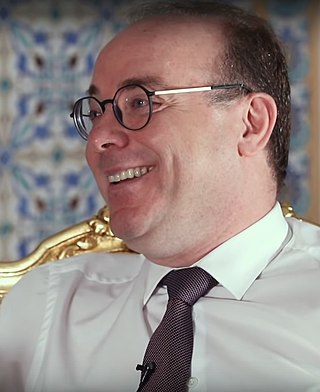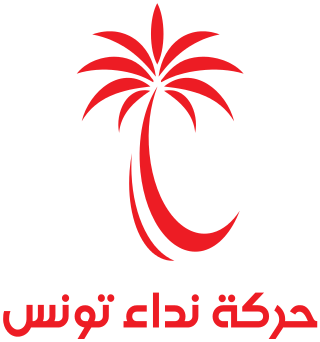
The politics of Tunisia takes place within the framework of a unitary semi-presidential representative democratic republic, with a president serving as head of state, prime minister as head of government, a unicameral legislature and a court system influenced by French civil law. Between 1956 and 2011, Tunisia operated as a de facto one-party state, with politics dominated by the secular Constitutional Democratic Rally (RCD) under former presidents Habib Bourguiba and then Zine el Abidine Ben Ali. However, in 2011 a national uprising led to the ousting of Ben Ali and the dismantling of the RCD, paving the way for a multi-party democracy. October 2014 saw the first democratic parliamentary elections since the 2011 revolution, resulting in a win by the secularist Nidaa Tounes party with 85 seats in the 217-member assembly.

The Folketing, also known as the Parliament of Denmark or the Danish Parliament in English, is the unicameral national legislature (parliament) of the Kingdom of Denmark — Denmark proper together with the Faroe Islands and Greenland. Established in 1849, the Folketing was the lower house of the bicameral parliament called the Rigsdag until 1953; the upper house was the Landsting.
Poland has a multi-party political system. On the national level, Poland elects the head of state – the president – and a legislature. There are also various local elections, referendums and elections to the European Parliament.

Elections in Lithuania are held to select members of the parliament, the president, members of the municipal councils and mayors, as well as delegates to the European Parliament. Lithuanian citizens can also vote in mandatory or consultative referendums.
There are five types of elections in the United Kingdom: elections to the House of Commons of the United Kingdom, elections to devolved parliaments and assemblies, local elections, mayoral elections, and Police and Crime Commissioner elections. Within each of those categories, there may also be by-elections. Elections are held on Election Day, which is conventionally a Thursday, and under the provisions of the Dissolution and Calling of Parliament Act 2022 the timing of general elections can be held at the discretion of the prime minister during any five-year period. All other types of elections are held after fixed periods, though early elections to the devolved assemblies and parliaments can occur in certain situations. The five electoral systems used are: the single member plurality system (first-past-the-post), the multi-member plurality, the single transferable vote, the additional member system, and the supplementary vote.

Presidential elections were held in Tunisia on 23 November 2014, a month after parliamentary elections. They were the first free and fair presidential elections since the country gained independence in 1956, and the first direct presidential elections after the Tunisian Revolution of 2011 and the adoption of a new Constitution in January 2014.

The Democratic Forum for Labour and Liberties, also referred to as Ettakatol or by its French acronym FDTL, is a social democratic political party in Tunisia. It was founded on 9 April 1994 and officially recognized on 25 October 2002. Its founder and Secretary-General is the radiologist Mustapha Ben Jafar.

An election for a constituent assembly in Tunisia was announced on 3 March 2011 and held on 23 October 2011, following the Tunisian revolution. The Assembly had 217 members. It was the first free election held in Tunisia since the country's independence in 1956, as well as the first election in the Arab world held after the start of the Arab Spring.

Habib Essid is a Tunisian politician who was Head of Government of Tunisia from 6 February 2015 to 27 August 2016. He was the first Head of Government to be appointed following the adoption of the new constitution and thus considered to be the first Head of Government of the Second Tunisian Republic. He previously served as Minister of the Interior in 2011.

The Free Patriotic Union, known by its French acronym UPL, is a political party in Tunisia.

Elyes Fakhfakh is a Tunisian politician. He served as the Minister of Tourism and, starting on 19 December 2012, as the Minister of Finance as well, under Prime Minister Hamadi Jebali. He served as the Prime Minister of Tunisia from 27 February to 2 September 2020.

Nidaa Tounes is a big tent secularist political party in Tunisia. After being founded in 2012, the party won a plurality of seats in the October 2014 parliamentary election. The party's founding leader Beji Caid Essebsi was elected President of Tunisia in the 2014 presidential election.

The People's Movement or Echaab Movement is a political party in Tunisia. It is a secularist, social democratic, Nasserist and Arab nationalist party founded in April 2011. The composition of the party has changed several times as a result of mergers and splits. Between 2013 and 2014, the People's Movement was a member of the Popular Front coalition, one of the three main coalitions of political parties in Tunisia. The former leader and founder of the party, Mohamed Brahmi, was assassinated on 25 July 2013 by unknown killers.

Parliamentary elections were held in Tunisia on 26 October 2014. Campaigning started on 4 October 2014. They were the first free regular legislative elections since independence in 1956, and the first elections held following the adoption of the new constitution in January 2014, which created a 217-seat Assembly of the Representatives of the People. According to preliminary results, Nidaa Tounes gained a plurality of votes, winning 85 seats in the 217-seat parliament, beating the Ennahda Movement and many smaller parties.

The Assembly of the Representatives of the People is the lower house of the Parliament of Tunisia. The Assembly replaced the Constituent Assembly and was first elected on 26 October 2014. The legislature consists of 161 seats. Before the 2011 revolution, Tunisia's parliament consisted of an upper chamber called the Chamber of Advisors and a lower chamber called the Chamber of Deputies.

Youssef Chahed is a Tunisian politician who served as the 14th prime minister of Tunisia from 27 August 2016 to 27 February 2020. He served as Secretary of State for Fisheries and Minister of Local Affairs in the past. Since the revolution in January 2011, Prime Minister Chahed has fought for press freedom, speech freedom, and the preservation of civil rights in Tunisia. He successfully oversaw a campaign against terrorist organizations including Al Qaeda and ISIS during his mandate. In the Arab world, he was a leader in the struggle against mafia barons, smugglers, and corruption. He was able to address Tunisia's public budget challenges in spite of a challenging economic environment by utilizing a program that Tunisia had signed with the World Bank and the International Monetary Fund.

Liberalism in Tunisia, or Tunisian Liberalism, is a school of political ideology that encompasses various political parties in the country.

General elections were held in Namibia on 27 November 2019. Ballots were cast using electronic voting. A total of eleven candidates ran for the presidency and fifteen political parties contested the National Assembly elections.

Parliamentary elections were held in Tunisia on 17 December 2022 to elect the third Assembly of the Representatives of the People. Run-offs were held on 29 January 2023 in the vast majority of constituencies after only 21 candidates were elected in the first round.

The Fakhfakh Cabinet was the 30th government of the Tunisian Republic. It was formed by Elyes Fakhfakh on the appointment of President Kais Saied.



















